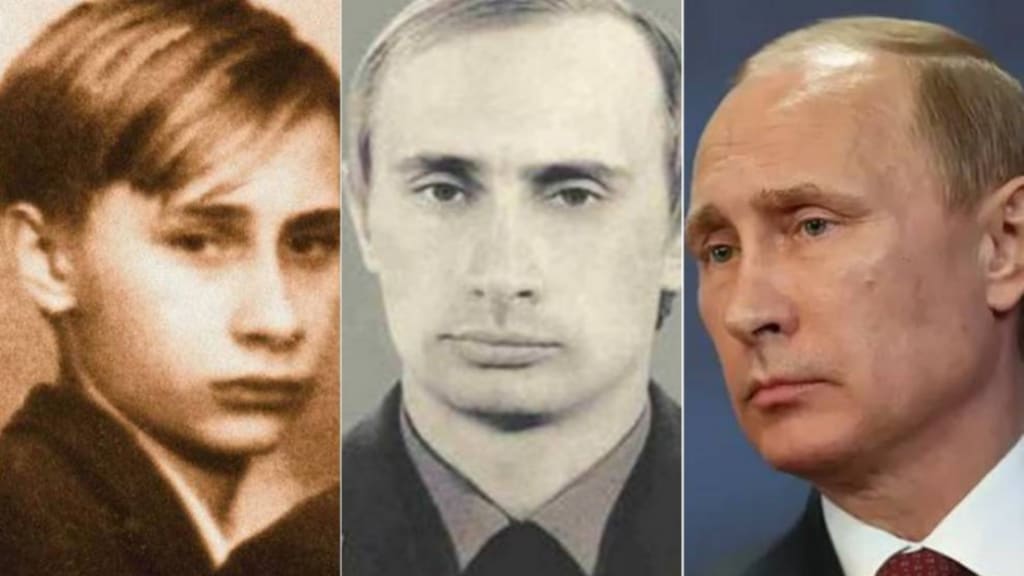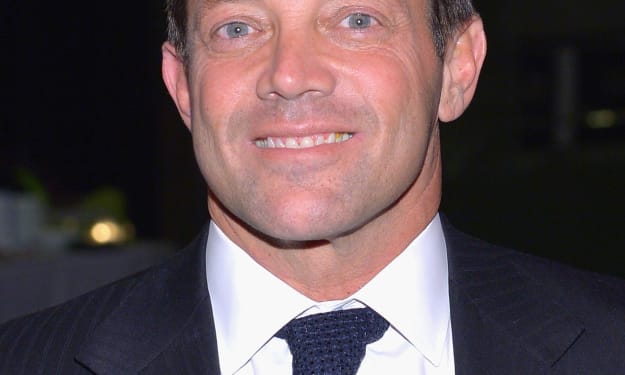
Vladimir Putin Biography: Early Life, Family, Education, Marriage, Children
He was born on 7 October 1952 in Leningrad, Russia, U.S.S.R. (now St. Petersburg, Russia). He is the youngest of three children. His father was Vladimir Spiridonovich Putin and his mother was Maria Ivanovna Putina. Vladimir Putin's grandfather named Spiridon Putin was a personal cook to Vladimir Lenin and Joseph Stalin. His mother was a factory worker and his father was a conscript in the Soviet Navy. He served in the submarine fleet in the early 1930s. His father also served in the destruction battalion of the NKVD in early World War II. Later, he was transferred to the regular army and in 1942, was severely wounded.
Mr. Putin recalls "I come from an ordinary family, and this is how I lived for a long time, nearly my whole life. I lived as an average, normal person and I have always maintained that connection."
Mr. Putin said, "We lived simply – cabbage soup, cutlets, pancakes, but on Sundays and holidays my Mom would bake very delicious stuffed buns [pirozhki] with cabbage, meat, and rice, and curd tarts [vatrushki]."
After the war, Putin's family moved into a room in a communal apartment in a typical ST Petersburg dwelling house on Baskov Lane. He attended Primary School No. 193 in Leningrad in 1960-68. After eighth grade, he attended High School No. 281. It was a chemistry-focused magnet school under the aegis of a technology institute and he completed his studies there in 1970.
He did his graduation in 1975. His thesis was on "The Most Favored Nation Trading Principle in International Law".He joined there the Communist Party of the Soviet Union and remained a member until it ceased to exist. He met Anatoly Sobchak who was an assistant professor and taught business law. Later, became the co-author of the Russian constitution and of the corruption schemes persecuted in France. He married Lyudmila Shkrebneva and the couple has two daughters, Mariya and Katerina.
Vladimir Putin: Early Career
He served around 15 years as a foreign intelligence officer for the KGB (Committee for State Security), including six years in Dresden, East Germany. He retired from the active KGB service in 1990 with the rank of lieutenant colonel and returned to Russia to become a protector of Leningrad State University and had responsibility for the institution's external relations.
He then became an adviser to Sobchak, the first democratically elected mayor of St. Petersburg. He gained the confidence of Sobchak and is known for his abilities to get things done.
He had risen to the post of first deputy mayor in 1994. He then moved to Moscow in 1996 and joined the presidential staff as deputy to Pavel Borodin, the Kremlin's chief administrator. He grew close to fellow Leningrader Anatoly Chubais and moved to administrative positions.
Pres. Boris Yeltsin in July 1998 made Putin director of the Federal Security Service. Thereafter, he became the secretary of the influential Security Council. In 1999, Yeltsin appointed Putin as Prime Minister.
Virtually, he was not well known to the public. His approval ratings to the public soared when he launched a well-organised military operation against secessionist rebels in Chechnya. The public in Russia appreciated the coolness of Putin. He further supported a new electoral bloc, Unity, and ensured success in the December parliamentary elections.
Vladimir Putin's First and Second Presidential Term (2000-2004 and 2004 - 2008)
Yeltsin unexpectedly announced his resignation on 31 December 1999 and named Putin as acting President. Putin easily won the March 2000 election with about 53 percent of the vote. As president, he promised to end corruption and also to create a strong regulated market economy. He quickly reasserted control over Russia's 89 regions and republics. He divided them into seven new federal districts and each was headed by a representative appointed by the president. He removed right of the regional governors to sit on the Federation Council which is the upper house of the Russian parliament. He also reduced the power of Russia's unpopular financiers and media tycoons' so-called "Oligarchs" by closing various media outlets and launching criminal proceedings against various leading figures.
In Chechnya, he faced a difficult situation mainly from rebels who staged terrorist attacks in Moscow and guerilla attacks on Russian troops from the region's mountains. He also declared a military campaign in 2002 but casualties remained high.
In 2001, he strongly objected to U.S. President George Bush's decision to abandon the 1972 Anti-Ballistic Missile Treaty. In 2002-2003, Putin joined German Chancellor Gerhard Schroder and French Pres. Jacques Chirac opposed U.S. and British plans to use force to push Saddam Hussein's government in Iraq.
The economy of the country saw growth after a prolonged recession in the 1990s and so Putin was easily reelected in March 2004. In December 2007, in parliamentary elections, Putin's party, United Russia, won an overwhelming majority of seats. A constitutional provision forced Putin to step down in 2008 and he chose Dmitry Medvedev as his successor.
Vladimir Putin as Prime Minister (2008-2012)
In March 2008, Dmitry Medvedev won the presidential election, and Putin was announced to be the chairman of the United Russia Party. Medvedev nominated Vladimir Putin as the country's Prime Minister within hours of taking office on 7 May 2008.
On 24 September 2011, at the United Russia Congress in Moscow, Medvedev officially proposed that Putin stand for the Presidency in 2012. This offer was accepted by Putin. However, on 4 March 2012, Putin was elected to a third term as the President of Russia. He resigned as United Russia chairman and handed control of the party to Medvedev. On 7 May 2012. Putin was inaugurated as President and one of his first acts after assuming office was to nominate Medvedev to serve as Prime Minister.
Vladimir Putin's Third Presidential Term (2012-2018)
His first year the office was characterised by a largely successful effort to stifle the protest movement. Leaders in opposition were jailed and nongovernmental organisations that received funding from abroad were labeled as "foreign agents". In June 2013, tensions with the United States flared when U.S. National Security Agency (NSA) contractor Edward Snowden sought refuge in Russia after revealing the existence of a number of secret NSA programmes.
In Russia, Snowden was allowed on the condition that, in Putin's words, he stop "bringing harm to our American partners.” In August 2013, an attack of chemical weapons took place outside Damascus made the U.S the case for military intervention in the Syrian Civil War. In an editorial published in the New York Times, Putin urged restraint, and U.S and Russian officials brokered a deal in which Syria's chemical weapons supply would be destroyed.
In December 2013, Putin commemorated the 20th anniversary of the adoption of the post-Soviet Constitution and ordered the release of some 25,000 individuals from Russian prisons. Also, he granted a pardon to Mikhail Khodorkovsky who was the former head of Yuko's oil conglomerate. He was imprisoned for more than a decade.
Vladimir Putin's Fourth Presidential Term (2018-Present)
In 2018, he won the presidential election with more than 76% votes. On 7 May 2018, his fourth term began and will last until 2024. Also, on the same day, he invited Dmitry Medvedev to form a new government. He took part in the opening of the movement along the highway section of the Crimean bridge on 15 May 2018. He signed decrees on the composition of the new Government on 18 May 2018. He further announced that he would not run for president in 2024 on 25 May 2018. He opened the 21st FIFA World Cup on 14 June 2018 and it took place in Russia for the first time.
Dmitry Medvedev and his entire government resigned on 15 January 2020 after Vladimir Putin's Address to the Federal Assembly. Putin also suggested major constitutional amendments that could extend his political power after the presidency. It was suggested by the president that Medvedev take the newly created post of Deputy Chairman of the Security Council.
Putin on the same day nominated Mikhail Mishustin, head of the country's Federal Tax Service for the post of Prime Minister. The next day, he was confirmed by the State Duma to the post and appointed Prime Minister by Vladimir Putin's decree. This was the first time a Prime Minister was confirmed without any votes against. Mishustin presented to Vladimir Putin a draft structure of his Cabinet on 21 January 2020. The president signed a decree on the structure of the Cabinet and appointed the proposed Ministers on the same day.
At the time of COVID-19 Pandemic
He was instructed to create a Working Group of the State Council on 15 March 2020 to counteract the spread of coronavirus. He appointed Moscow Mayor Sergey Sobyanin as the head of the Group.
He arranged the Russian army after a phone call with Italian PM Giuseppe Conte to send military medics, special disinfection vehicles, and other medical equipment to Italy.
He also visited a hospital in Moscow's Kommunarka on 24 March 2020 where patients with coronavirus are kept. He spoke with them and the doctors. He worked remotely from his office at Novo-Ogaryovo.
He announced in a televised address to the nation on 25 March that the 22 April constitutional referendum would be postponed because of coronavirus. He also announced that the next week would be a nationwide paid holiday and urged Russians to stay at home.
He also provided and announced a list of measures of social protection, support for small and medium-sized enterprises, and changes in fiscal policy. He also announced measures for microenterprises, small- and medium-sized businesses deferring tax payments except for Russia's value-added tax for the next six months. Also cut the size of social contributions in half, deferring social security contributions, deferring loan repayments for the next six months, a six-month moratorium on fines, debt collection, and creditors' applications for bankruptcy of debtor enterprises.
He again issued an address on 2 April 2020, in which he announced prolongation of the non-working time until 30 April. Putin said that he was fully vaccinated against the disease with the Sputnik V Vaccine in June 2021.





Comments
There are no comments for this story
Be the first to respond and start the conversation.